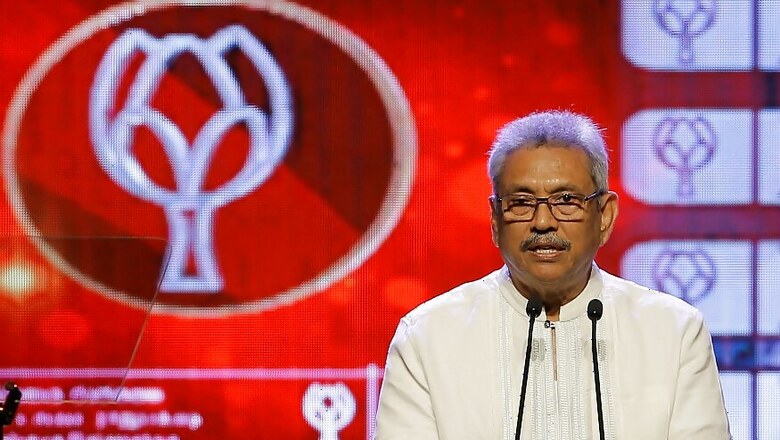
views
Bengaluru: The Sri Lankan presidential election has entered its final and decisive phase. The Indian Ocean island nation and one of India's closest neighbours will elect a new president on November 16. This election has already divided the nation vertically, putting the island on tenterhooks.
For the first time in the history of Sri Lanka's executive presidency, no sitting president, prime minister or leader of opposition is contesting in the presidential election. One of the two major political parties in the country, Bandaranaike’s Sri Lanka Freedom Party (SLFP), is not contesting either.
Even though there are 35 candidates in the fray and the ballot paper is almost three feet in length, the main fight is between former defence secretary Gotabaya Rajapaksa of newly founded Sri Lanka Podujana Peramuna (SLPP), a breakaway faction of SLFP, and deputy leader of ruling United National Party (UNP) Sajith Premadasa.
The SLPP is contesting on Lotus symbol and the UNP’s symbol is the Swan.
Gotabaya, the younger brother of former president Mahinda Rajapaksa, is feared and admired across the island. He faces war crime charges allegedly committed during the final phase of the war with Tamil separatist outfit LTTE in 2009. He is also accused of eliminating unfavourable journalists by dispatching dreaded white vans to abduct them from the roads.
Gotabaya is using hyper Buddhist Sinhala nationalism to win the support of majority Sinhalese who form about 70% of the nation’s population. Attacking the UNP for its failure to prevent the deadly Easter bombings last April and protect military personnel from prosecution, Gotabaya, known as ‘GR’ is campaigning across the island.
He is also promising an all-round economic development of Sri Lanka, blaming the UNP for current economic slowdown. After the Easter bombings, tourism has taken a big hit and GR is using it as one of the main issues to mobilise voters in his favour.
Sajith Premadasa, the 52-year-old UK and US-educated politician, is banking on his clean image and the UNP’s organisational clout to defeat GR. It is a well-known fact that Sajith has literally forced the UNP to make him the presidential candidate, rubbing many big leaders, including prime minister Ranil Wickremesinghe, off the wrong way. He is also invoking the name of his father, the late president Ranasinghe Premadasa, who was assassinated by a suspected LTTE suicide bomber in 1993.
To counter GR’s Sinhala nationalism card, Sajith is using an all-round development card, promising everything to everyone. “He is desperate to win. That’s why Sajith is making impossible promises. It may dent GR’s core vote bank. If elected, Sajith may not be able to fulfill half his promises. The same applies to GR. He is also promising all kinds of things,” said a senior cabinet minister on condition of anonymity.
Buddhist-majority Sri Lanka has about 12% Tamils, 10% Muslims, 7% Christians and 1% Others. All minorities together form a solid vote bank with 30% share. Since GR is known for his Sinhala chauvinism, minorities are expected to back Sajith. But, there are also divisions among them.
Christian votes have been split after the Easter bombings and many of them may back Gotabaya. Muslims, who are at the receiving end after the bombings, are scared. Left with no other options, majority of them are likely go with Sajith against GR, who allegedly backs anti-Muslim radical Buddhist outfits like Bodu Bala Sena (BBS).
The Tamil voters are also divided. There are two types of Tamils in Sri Lanka. The native Tamils in the north and eastern provinces are known as Sri Lankan Tamils. The Tamils from tea estates in the high lands are called Indian Tamils who migrated to the island to work in its coffee and tea estates over the last 200 years.
The Sri Lankan Tamils are mostly with Sajith because of GR’s hardcore anti-Tamil stance. But he has broken the Indian Tamil votes by getting the powerful Ceylon Workers Congress (CWC) on his side.
The UNP strategists feel that the party has its own 40% votes and the remaining 10% swing votes can be managed with the help of former president Chandrika Kumaratunga who is livid with GR and MR, whom she holds responsible for the collapse of her parents’ party, the SLFP.
“Majority SLFP workers are not with SLPP. They are hurt and angry. Chandrika can transfer at least 10 lakh votes to Sajith. If she can manage more, it will be the end of the Rajapaksas in Sri Lanka politics,” said a close associate of Chandrika.
According to ground reports, GR has an edge over the others in southern, Uva and Sabaragamuva provinces. He is in a neck-and-neck fight in central, north-central and western provinces. Sajith has a clear lead in northern, eastern and north western provinces.
For the first time in Sri Lanka’s electoral history, both candidates are extensively using social media, newspapers, TV and public display systems for campaigning. The island nation has been flooded with all kinds of modern and innovative campaign materials.
Regional superpower India, which was accused of working against the then president Mahinda Rajapaksa in the 2015 presidential elections, is keeping quiet this time. According to a Colombo-based senior journalist, the Indian High Commission is maintaining radio silence on the elections.
“India will have to work with whoever wins. Maybe they don’t want to play games. It is good for both,” said a senior Sri Lankan bureaucrat.
The Marxist Janatha Vimukthi Peramuna (JVP) has fielded Anura Kumara Dissanayaka and former army commander Mahesh Senanayake is also in the fray.
Some even feel that for the first time, Sri Lanka may have to go for counting second preference votes if no candidate secures 50% plus 1 vote to become the president in the first round.



















Comments
0 comment